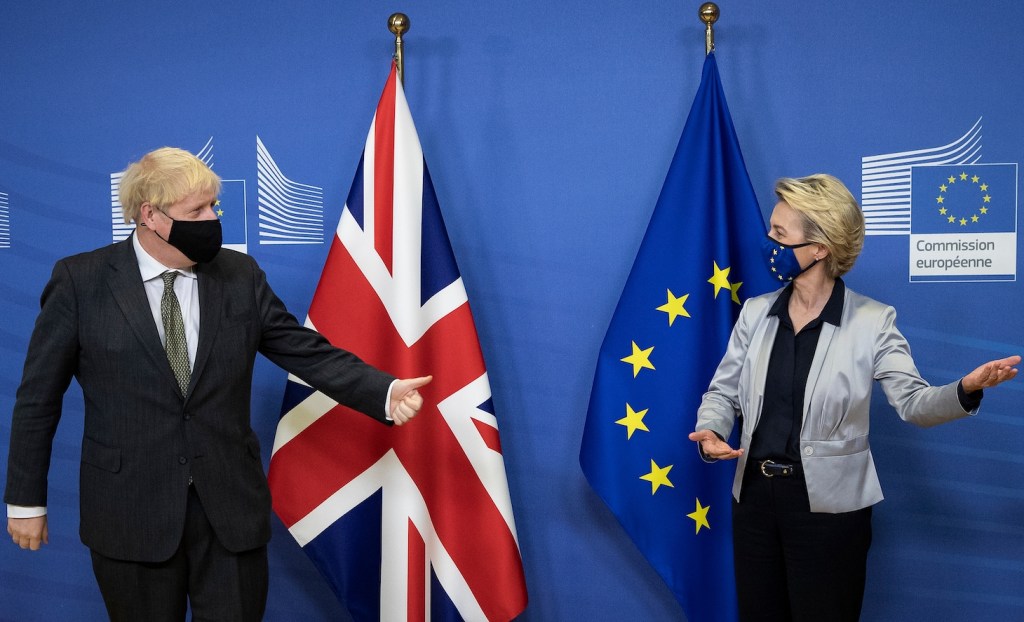Since the outrage caused last Friday, when the European Union looked set to undermine the Northern Ireland protocol less than one month after the Brexit deal came into force, there has been little apology from those in charge. This is not terribly surprising: European Commission President Ursula von der Leyen has a reputation for passing the buck whenever possible. It’s also thought that last week’s mistakes are particularly hard for the EU to grapple with: desperate to prove Brexit was a mistake, it has been difficult for Brussels to watch Britain’s reputation for handling the COVID crisis change so quickly for the better.
Yesterday we got a hint of acknowledgement from von der Leyen that perhaps there are some benefits to being outside the EU. As Mr Steerpike reports, she admitted that operating outside of a large bloc of countries has its upsides, though ultimately still defended the EU approach:
‘I’m aware that a country might be a speedboat and the EU more a tanker. If we conclude a contract, we need another five days for the member states to say, “yes” – and these are five days, five working days… So, obviously, of course a decision taken by 27 lasts longer than if you just go by yourself, but I am deeply convinced that the European approach is the right one.’
In theory, any EU country could have gone the way of the UK: being in the EU didn’t require countries to source their vaccines through Brussels’s institutions (though once they signed up to the EU’s procurement scheme, countries were strictly instructed not to negotiate bilateral contracts). Von der Leyen calls the experience a ‘bitter learning’ process – but what exactly has been learned?
It’s likely, given her emphasis on manufacturing and supply, that ultimately the takeaway will be a bigger, more hands-on state. Her focus has been on mass production: something the UK planned for alongside securing contracts for the jabs themselves. The UK’s purchase of bioreactors — which are needed to mass-produce vaccines — has increased its vaccine independence and security. As James Forsyth detailed last week, even Tory MPs who would normally be skeptical of the state meddling with market mechanisms see the vaccine race as an example of industrial strategy gone right. It’s increasingly clear the EU views the UK’s actions in the same way, pondering how state investment can go further.
But it would be a mistake to overlook the other reasons why the UK’s vaccine rollout is storming ahead: including the benefit of having a regulator that took care but acted quickly in its deliberations over vaccine approval. The UK was the first country in the world to start administering Pfizer vaccine doses, after the Medicines and Healthcare Products Regulatory Agency approved the vaccine in early December, and then the Oxford vaccine at the end of the month. The European Medicines Agency trailed the Pfizer decision by weeks, and the Oxford decision by nearly a month. (The EMA was first to approve the Moderna vaccine early last month, but the MHRA followed suit just two days later.)
The detrimental impact of these delays has not been recognized by the EU. Instead, Von der Leyen has defended the bloc’s timeline in the strangest of ways: attempting to undermine the decisions taken by the UK regulator, by coyly suggesting safety standards were compromised to speed up the process. Meanwhile, leaders in the UK have been working round the clock to encourage people to take the jabs; leaders in the EU’s largest countries, including France and Germany, have been working against the EMA’s advice on the Oxford vaccine, refusing to approve its use for over-65s.
Procurement strategies have no doubt been vital in the vaccine race. But they do not exist in isolation: the benefit of having a smart, nimble regulator has enabled Britain to pass the 10 million jab mark this week, more doses than administered in France, Germany, Spain and Italy combined. Von der Leyen’s takeaway from the competing strategies shouldn’t simply be where the state needs to invest more, but how to get ‘tanker’ bureaucracy out of the way.
This article was originally published on The Spectator’s UK website.


















